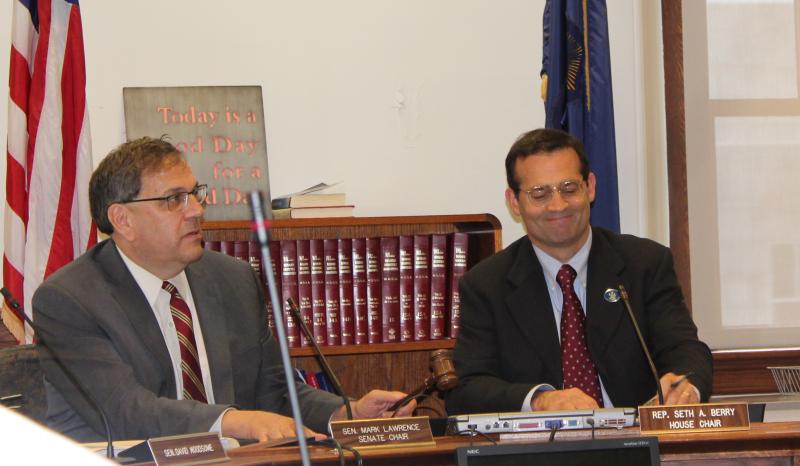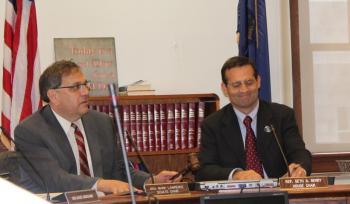Legislator explains consumer-owned utility bill to Boothbay Indivisible
In March, a power struggle over who controls the state’s two largest utilities will convene in the Maine Legislature. Legislators will consider a bill to create a consumer-owned utility that would replace Central Maine Power and Emera Maine. The bill’s chief sponsor is Rep. Seth Berry, D-Bowdoinham, a six-term legislator. He also chairs the legislature’s Energy, Utilities and Technology Committee.
Berry discussed LD 1646: An Act To Restore Local Ownership and Control of Maine’s Power Delivery System Dec. 11 during Indivisible Boothbay’s monthly meeting. The proposal follows two difficult years for CMP with controversies around smart meters and a new billing system. On Oct. 30, 2017, CMP rolled out its new billing system and customers began complaining after seeing their bills increased over 50%. The Maine Public Utilities Commission launched an investigation after receiving over 97,000 complaints. Emera Maine has served customers since 2002 when it acquired Bangor Hydro. Emera has had relatively few customer complaints, but Berry’s bill also impacts the utility.
Berry explained the bill’s purpose is based as much on economics as customer service. He used Boothbay’s “Non-wires Alternative Project” as an example of providing customers with more power at a lower cost. State officials received two proposals for providing more electrical energy to meet the Boothbay region’s peak summer demand. CMP submitted an $18 million proposal for extending power lines into the region, according to Berry. But another less expensive plan emerged using solar power at a projected $6 million cost which eventually was implemented.
“Boothbay opened a lot of eyes in Augusta to what is possible. The alternate proposal came in at one-third of CMP’s proposal. The $18 million plan included a 13% profit plus corporate taxes baked into the agreement. So it would’ve been a whole lot more expensive than $18 million, and wouldn’t have been good for the people of Maine,” Berry said.
CMP is the state’s largest power utility with over 600,000 customers in central and southern Maine. Emera is the second largest with over 130,000 customers in the greater Bangor region. If Berry’s bill becomes law, both would be combined into one consumer-owned utility, Maine Power Delivery Authority. The new company would begin acquiring CMP’s and Emera’s transmission and distribution assets with fair compensation. Maine Power would also hire a management company to operate it.
Berry believes if the Legislature approves the COU, the process would be “uncomplicated” and take a couple years to complete. But Emera and CMP officials disagree. The two testified during legislative hearings, LD 1646 would result in a long, contested court battle. Emera Maine Vice President Timothy Pease described the bill as violating the two companies’ constitutional rights.
A potential state acquisition of the two power companies may resemble a similar one 21 years ago in New York. During his Boothbay presentation, Berry described the New York Legislature acquiring a Long Island private power company. “When LIPA (Long Island Power Authority) took over, rates for all customers immediately dropped by 20%,” he said. “Today, rates remain lower than neighboring Con Edison. Prior to 1998, they had been the highest in the nation. LIPA’s recent improvements and competitive, contracted management are mirrored in the Maine Power proposal.”
Berry also pointed out another advantage Maine ratepayers would have as a COU. He told his Boothbay audience, after Hurricane Sandy damaged a significant portion of the Northeast, LIPA received $898 million in federal disaster relief. “Only consumer-owned utilities can receive such help,” he said.
But in November, Pease didn’t paint nearly as bright a picture as Berry did about the New York example. Pease listed how long it has taken four other municipalities to wrestle control of publicly owned power companies: Sacramento, California, 23 years; Las Cruces, New Mexico, 12 years; and 13 years for New York to acquire LIPA. He also reported it took 10 years for Boulder, Colorado to acquire Xcel Energy’s interest. “A decade later, the takeover remained tied up in legal battles that have cost the city over $15 million. More recently, the takeover effort took a step backward with a settlement among the parties. The agreement requires Boulder to dissolve the municipal utility, and repeal the ordinances that formed it. To proceed, a future referendum must be held and approved. It is not clear whether or when the takeover effort will proceed,” he said.
Berry promises the COU would improve customer service and reduce costs. Berry told Boothbay Indivisible the state can acquire the two electric companies’ assets through eminent domain and the purchase cost would be easily absorbed in the current rate structure. But CMP and Emera officials doubt Berry’s claim about saving consumers money and improving customer service.
In his November testimony, Pease told Berry and his committee the cost to buy both private power utilities would be nearly $9 billion. He urged the committee to proceed cautiously as the proposal needed more evaluation first. “The most reasonable conclusion is more study is needed before embarking upon a substantial overhaul of Maine’s electric system, with no guarantee of lower rates or better service,” he said. “The need for further study is imperative because the takeover will cost billions, and throw Maine’s entire electric grid into turmoil at a time when stability is needed to carry out the State’s goals of lowering carbon emissions.”
In a May legislative committee hearing, CMP Vice-President, Comptroller and Treasurer Eric Stinneford challenged assertions that COUs provided lower cost and better service. He noted that Maine’s electrical power rates are the lowest in New England and the Northeast. He cited a U.S. Energy Information Administration study showing Maine had the lowest electrical rates for both regions, at 13.02 kilowatt per hour. He said New Jersey, at 13.32, New York, at 14.74, and California, at 16.74, all have higher rates. Stinneford also reported CMP’s rates were lower than Emera Maine’s and three out of five COUs. “Focusing within our border, CMP delivery rates are lower than half of Maine’s COUs. This includes Eastern Maine Electrical Cooperative whose large service territory is the only one which approaches Maine’s state investor utilities,” he said.
Berry believes Emera Maine and CMP take advantage of ratepayers through lucrative financial deals approved by the Maine Legislature. In Boothbay Harbor, he complained about lobbyists for years working against various consumer protection bills, solar energy and efficiency bills. He also pointed toward CMP’s Maine Power Reliability Project, a current initiative which is a $1.4 billion transmission line upgrade, as not being in ratepayers’ best interest. “It’s an investment in our grid, but what they didn’t tell you is, half of it’s in equity. They get it back with 13% interest over a 20-year period. This is an insanely high profit which is baked into our rates and their taxes,” he said.
Berry also charged that CMP cuts corners in customer service which he blamed for problems with their smart meters and billing system implementations. CMP spokesman Catharine Hartnett said any charges that the firm hadn’t made a substantial investment in the state’s infrastructure are “patently false.” She reported that between 2009 and 2019, CMP had invested nearly $3.5 million in new infrastructure. “That’s about three times what the company earned in that period,” she said.
The new equipment includes smart meters which she said were implemented and working in Maine since 2012. CMP has also made an effort to improve customer satisfaction with a new initiative. “Power On is a company-wide initiative beginning with the CEO right down to customer service staff. We have recommitted to ensuring that all employees understand how they must work toward meeting customer expectations,” Hartnett said.
Despite being a regulated monopoly, Berry believes CMP and Emera have too much influence over the Legislature and PUC, who holds jurisdiction over them. He described the power companies’ influence as a “stranglehold.” He quoted a former Democratic governor who believed the state’s largest power company had too much legislative influence. “I remember Joe Brennan lamenting that ‘CMP owned the State House,’” he said. Berry described CMP’s long influence dating back 120 years to when the firm began. He said two more Democratic governors didn’t stand in CMP’s way. “It’s been a big problem for a long time, but it took Ed Muskie a long time to act. He did some really great work in challenging CMP and other businesses in cleaning up Maine’s rivers, but that didn’t come until late in his career.”
Berry also chastised former Governor John Baldacci who became a CMP board member after he left the Blaine House. “John is a friend of mine, but he didn’t do much as governor to stand up to CMP, and he’s now making $200,000 a year as a board member,” Berry said. In March, Berry predicted CMP and Emera and their lobbyists would encourage legislators to examine the proposal more closely. “The Maine Legislature has two lobbyists for every legislator and they are there to plant seeds of doubt,” he said.
But Berry has allies, too. He has employed bipartisanship in the bill’s co-sponsors. He told his Boothbay Harbor audience, Sen. David Woodsome of York and Rep. Marianne Moore of Calais, both Republicans, are co-sponsors.
Event Date
Address
United States

























